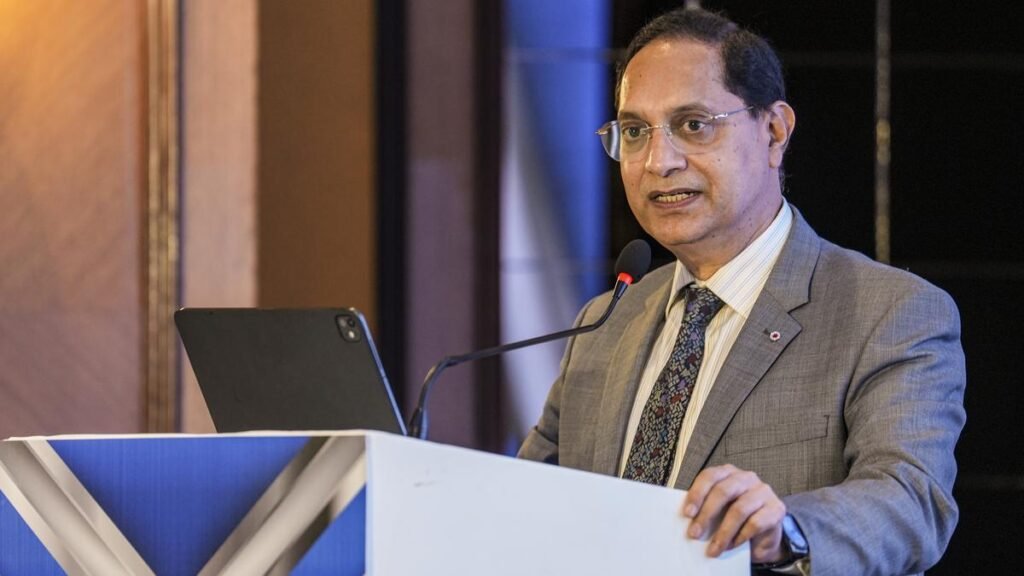
SEBI Chairman Tuhin Kanta Pandey addressing the ‘MCX Metals and Energy Summit 2025’, in Mumbai on Wednesday
| Photo Credit:
PTI
The Securities and Exchange Board of India (SEBI) is working on expanding participation in the commodity derivatives market to include foreign investors, banks, insurers, and pension funds. Industry participants have also urged the regulator to allow new contracts to start with cash settlement until they scale up, as this would draw investors, build liquidity and ease operations.
Speaking at an event organised by the Multi Commodity Exchange of India (MCX) on Wednesday, SEBI Chairman Tuhin Kanta Pandey said, “We will keep working towards a regulatory framework to enable prudent institutional access to these markets. A proposal to allow FPIs to trade in non-cash settled non-agricultural commodity derivative contracts is currently under examination.”
“We will also engage with the Government to consider banks, insurance companies, and pension funds to trade in these markets.” The regulator will also set up a committee for agricultural commodities and a working group for non-agricultural ones, including metals.
The industry has also sought flexibility for new commodities to be allowed to remain cash-settled until they achieve a minimum size — either 100 kg or 5 per cent of the commodity’s total size — before shifting to compulsory delivery, an exchange source said. This is expected to help attract investors and build operational efficiency in the early stages of new contracts.
Wider participation
“Participation of banks and foreign portfolio investors (FPIs) has already been tested in mutual funds, pension funds and FPIs in cash-settled contracts. There is enough space for banks, FPIs in non-cash settlement trade. A small tweak in the GST is required. Once it is done, this could take off,” Narinder Wadhwa, President, Commodity Participants’ Association of India (CPAI) said.
SEBI’s move to increase institutional participation has to be seen in the context of a rise in the value of trading in the commodities market. While gold has been touching record highs, silver is at a 14-year high, and copper prices reached an all-time high in July.
Naveen Mathur, Director, Commodities, Currencies and GIFT City, of Anand Rathi Group, said the move will boost efficiency in price discovery of these commodities and help both the producers and the user industry to hedge their risk in a more transparent manner.
FPIs, which are currently active in cash-settled commodity derivatives such as crude oil and natural gas, register an average daily turnover of ₹15,000 crore, said Mathur.
“The time has come to allow banks to trade in commodities,” said V. Shunmugam, Partner at MCQube, pointing out “Worldwide, banks are market makers in derivative contracts and are active arbitrageurs in international commodities besides being investors in physical metals. If full participation is not possible, banks should at the very least be allowed to hedge. This is a key enabler of OTC markets where most corporates hedge.”
Moreover, market experts believe that SEBI has to widen the open position for these institutions as their investment positions will be large.
Allowing banks to participate in commodity derivatives may also require RBI approval and an amendment to the Banking Regulation Act.
SEBI is also engaging with the Government to ease GST hurdles on physical delivery. By December, it plans to include commodity-specific brokers in a ‘Samuhik Prativedan Manch’ compliance platform.
MCX is also working with supply chain producers, brokers, and mutual funds to expand participation in metal contracts with all financial and commercial participants. “Banks can play a significant role as lending, corporate and market bankers,” CEO Praveena Rai said.
With inputs from Subramani Ra Mancombu, Suresh P Iyengar
Published on September 17, 2025

